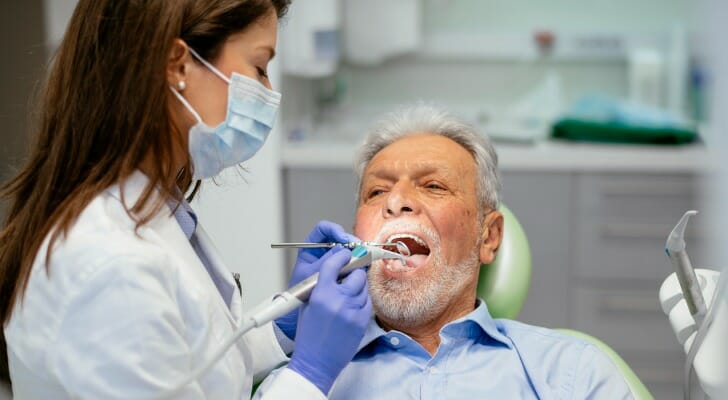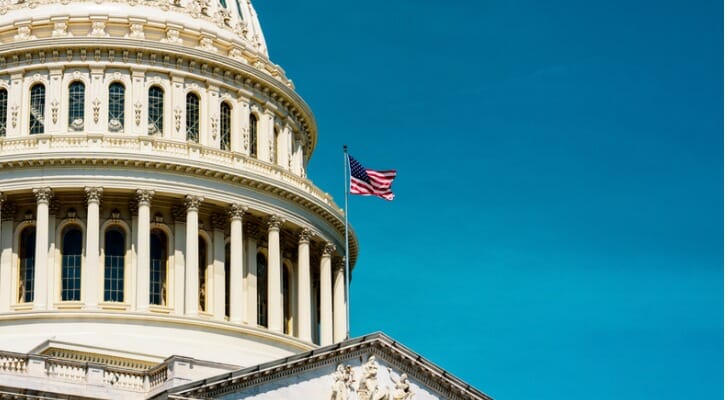Nearly half of all Medicare beneficiaries don’t have any dental coverage, but that could change under a proposed expansion of the safety net program. As millions of beneficiaries spend hundreds – or even thousands – of dollars out of pocket for dental care each year, Democrats in Washington, D.C., want Medicare to cover dental services, as well as hearing and vision care.
A financial advisor can help you plan for future healthcare expenses. Find an advisor now.
Under a proposal unveiled Tuesday by House Democrats, Medicare beneficiaries would receive vision and hearing benefits over the next two years, with dental benefits kicking in by 2028. The proposal comes one month after Senate Democrats announced an agreement to include the Medicare expansion as part of the $3.5 trillion budget proposed for 2022.
Medicare Coverage Gaps
Because traditional Medicare does not cover dental services, 47% of Medicare beneficiaries have no dental care at all, according to the Kaiser Family Foundation’s recent report on Medicare and dental coverage.
While 29% of beneficiaries are enrolled in Medicare Advantage plans that provide some dental coverage, those who sought dental care in 2018 spent an average of $874 out of their own pockets. In fact, one in five Medicare beneficiaries spent more than $1,000 on dental services.
This coverage gap appears to be deterring many seniors from going to the dentist altogether. Forty-seven percent of all beneficiaries did not have a dental visit in the past year. That number was even higher for Black (68%) and Hispanic (61%) beneficiaries, according to the Kaiser Family Foundation report. Meanwhile, 73% of beneficiaries with low incomes did not go to the dentist in the year leading up to the report’s publication.
“Lack of dental care can exacerbate chronic medical conditions, such as diabetes and cardiovascular disease, contribute to delayed diagnosis of serious medical conditions, and lead to preventable complications that sometimes result in costly emergency room visits,” the report states. “Limited or no dental coverage and cost concerns contribute to Medicare beneficiaries foregoing routine and other dental procedures.”
Democrats Seek Medicare Expansions
Gears are turning in Washington, D.C., to address the dental coverage gap and others. The proposal announced by Democrats on the House Ways and Means Committee on Tuesday would provide dental benefits to Medicare beneficiaries starting in 2028.
However, the plan elicited criticism from U.S. Sen. Bernie Sanders, I-VT, who said he does not think it should take “such a long time” to add dental coverage to Medicare, The Hill reported Wednesday.
This isn’t the Democrats’ first attempt to expand Medicare coverage to include dental, hearing and vision services. In July, U.S. Rep. Lloyd Doggett, D-Texas, introduced the Medicare Dental, Vision, and Hearing Benefit Act of 2021 (H.R. 4311). “This legislation provides Medicare beneficiaries swift access to necessary preventative care in 2022 and additional services thereafter,” Doggett said in a press release.
“It treats dental, vision, and hearing care the same as existing health care under Medicare, with no cost-sharing for preventative care and no more than the standard 20% copay for all other services.”
In 2019, the House of Representatives passed the Elijah E. Cummings Lower Drug Costs Now Act (H.R. 3), which sought to include dental, vision and hearing benefits in Medicare Part B. However, the legislation was never passed in the Senate. A newer version of the bill that was introduced earlier this year does not include a dental benefit as part of the Medicare expansion.
Bottom Line
Many Medicare beneficiaries spend hundreds, if not thousands, of dollars out of pocket each year on dental care. Nearly half of all beneficiaries don’t even seek dental services because of a lack of coverage, which can lead to serious health complications. Democrats on Capitol Hill want to expand Medicare to include dental benefits, as well as hearing and vision care. However, under a proposal unveiled Tuesday, dental coverage wouldn’t take effect until 2028, while hearing and vision benefits would kick in over the next two years.
Tips for Managing Healthcare Expenses
- A health savings account (HSA) is a tax-efficient way to save for healthcare needs. Your contributions reduce your taxable income and your money grows tax free. Meanwhile, withdrawals are also tax-free as long as you use the money on qualified medical expenses.
- A financial advisor can help you plan for your own long-term care or a loved one’s care. Finding a qualified financial advisor doesn’t have to be hard. SmartAsset’s free tool matches you with up to three financial advisors in your area, and you can interview your advisor matches at no cost to decide which one is right for you. If you’re ready to find an advisor who can help you achieve your financial goals, get started now.
Photo credit: ©iStock.com/Milos Dimic, ©iStock.com/skynesher, ©iStock.com/YayaErnst


